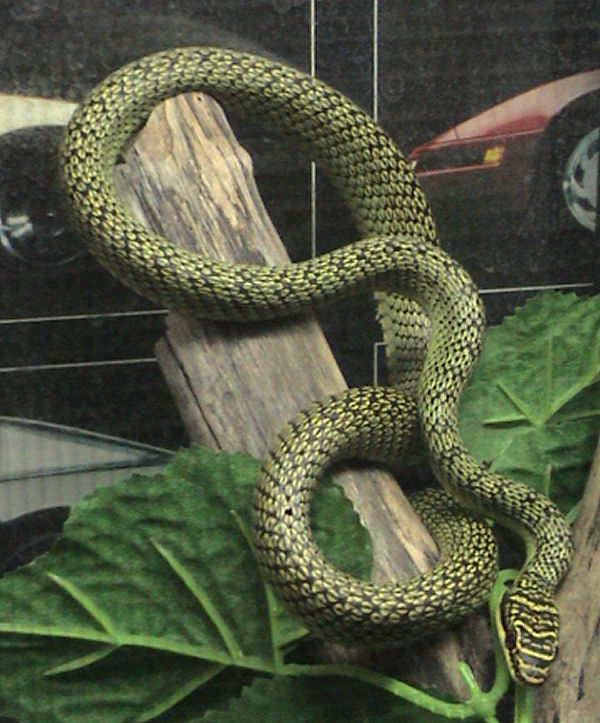|
| 질의: black squirrel | 결과: 42번째/97 | |
Flying Snake (Family: Colubridae, Genus: Chrysopelea) - Wiki
| 제목: | Flying Snake (Family: Colubridae, Genus: Chrysopelea) - Wiki
| |

| 해상도: 600x723
파일크기: 127771 Bytes
촬영일: 2004:07:20 13:14:23
사진기: DCR-TRV740 (SONY)
F number: f/1.6
Exposure: 1/60 sec
Focal Length: 64/10
등록시간: 2007:09:01 17:07:52
|
Chrysopelea
From Wikipedia, the free encyclopedia
[Photo] Ornate Flying Snake, Chrysopelia ornata. 20 July 2004. Photographer: User:Dawson http://en.wikipedia.org/wiki/User:Dawson
Chrysopelea, or more commonly known as the flying snakes, is a genus that belongs to the family Colubridae. Flying snakes are mildly venomous, though they are considered harmless because their toxicity is not dangerous to humans. Their range of habitat is mostly concentrated in Southeast Asia, the Melanesian islands, and India.
Gliders
Chrysopelea are called "flying snakes", though this is misleading, as they actually glide instead of flying. This is done by flattening their bodies to up to twice their width from the back of the head to the vent. Impressively, these snakes can glide better in comparison to flying squirrels and other gliding animals ??? a grand feat for a creature lacking any limbs, wings or wing-like projections. Their destination is mostly predicted by ballistics; however, they can exercise some in-flight attitude control by "slithering" in the air. Their ability to glide has been an object of interest for physicists in recent years, and studies continue to be made on what other, more subtle factors contribute to their flight. According to recent research conducted by the University of Chicago, scientists discovered a co-relation between size and gliding ability, in which smaller flying snakes were able to glide longer distances horizontally.
Species
There are five recognised species under the genus Chrysopelea. Of these five, the following three are the most well-recognised.
Golden Tree Snake or Ornate Flying Snake, Chrysopelea ornata (Shaw, 1802): This is the largest species of flying snake, reaching up to four feet in length. Though it is called the Golden Tree Snake, there are other colour variations; for example, some phases tend to lean towards lime green in colour rather than pure yellow, while in India, the Golden Tree Snake has orange to red markings and small black bars on the dorsum, almost as rich in colouration with the Paradise Tree Snake. Due to their size, their gliding ability is considered weak.
Paradise Tree Snake, Chrysopelea paradisi (Boie & Boie, 1827): This flying snake species reaches up to three feet in length and is popular in the European pet trade. Their body is black but covered in rich green scales. Clusters of red, orange and yellow-coloured scales in the shape of flower petals lines the dorsal area from the base of the neck till the tail. This is the most well-known colouration, but some specimens may exhibit fully-green colouration without any bright dorsal markings. Their gliding ability is considered one of the best among the flying snakes.
Twin-Barred Tree Snake or Banded Flying Snake, Chrysopelea pelias (Linnaeus, 1758): This is the smallest flying snake species, reaching up to two feet in length. It base colour is black or dark grey, and the entire body is covered with thick red and thin yellow with black bands. They also have creamish ventrolateral lines while the ventrals are pale green. While it is tiny, it is undoubtedly one of the most beautiful and rarest flying snake species within its range. It is also, quite possibly, the best glider among all the flying snakes.
Lesser studied species are:
Moluccan Flying Snake, Chrysopelia rhodopleuron (Boie, 1827)
Indian Flying Snake, Chrysopelia taprobanica (Smith, 1943)
http://en.wikipedia.org/wiki/Chrysopelea
| The text in this page is based on the copyrighted Wikipedia article shown in above URL. It is used under the GNU Free Documentation License. You may redistribute it, verbatim or modified, providing that you comply with the terms of the GFDL. |
|
^o^
동물그림창고 똑똑전화 누리집
^o^
|
|

